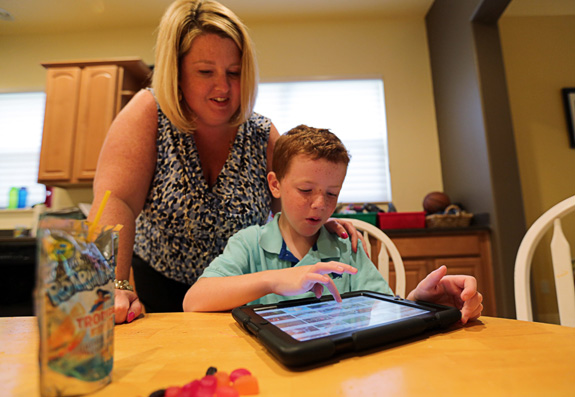Developmental Disorders More Common Than A Decade Ago

Lindsay Graham, left, watches son J.D., who has autism, at the family’s Orlando, Fla. home. The number of children with neurodevelopmental or mental health conditions jumped 21 percent between 2001 and 2011, likely due in part to increasing autism prevalence, researchers say. (Ricardo Ramirez Buxeda/Orlando Sentinel/MCT)
The number of children with disabilities is on the rise, largely due to growth in incidence of mental and developmental disorders, researchers say.
A new analysis published Monday in the journal Pediatrics finds that between 2001 and 2011, there was a 16 percent increase in the number of kids with disabilities.
Though children living in poverty remain more likely to have disabilities, the study found that the greatest increase in diagnoses was seen among children from wealthier families.
Advertisement - Continue Reading Below
For the study, researchers looked at data on nearly 200,000 kids from the National Health Interview Survey — a routine government poll of parents with children up to age 17 — collected between 2001 and 2011.
As part of the survey, parents were asked if their child had various limitations or disabilities and, if so, what condition the difficulties stemmed from. Deficits were then divided into three groups — physical disabilities, neurodevelopmental or mental health conditions and other.
Nearly 6 million American children — or roughly 8 percent — have a disability, the study found. Though the prevalence of physical disabilities declined over the study period, significantly more parents said that their children had neurodevelopmental or mental health issues in 2011 as compared to a decade earlier.
“This study demonstrates what a lot of pediatricians have been noticing for several years — that they are seeing more neurodevelopmental and mental health problems in their clinical practices,” said Amy Houtrow of the University of Pittsburgh who led the study. “As we look toward the future, the pediatric health care workforce and system needs to adapt to assure the best possible health and functional outcomes for children with disabilities related to neurodevelopmental and mental health conditions.”
Houtrow and her colleagues said the trend may be due to changes in diagnostic criteria, increased awareness, higher rates of autism and other conditions or a growing need for a specific diagnosis in order to access early intervention and other services.
Preliminary findings from the study were presented last year at the Pediatric Academic Societies annual meeting in Washington, D.C.
Read more stories like this one. Sign up for Disability Scoop's free email newsletter to get the latest developmental disability news sent straight to your inbox.

